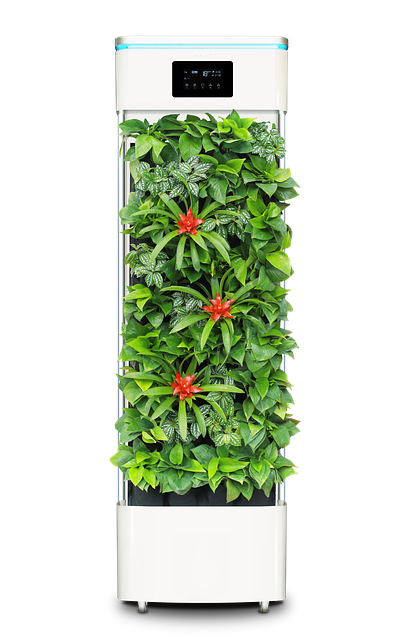BEST DESKTOP AIR PURIFIERS
1
Looking for an ultra-reliable air purifier you can use all day long to keep your home clean? Not only is this bad boy sized for larger spaces (up to 547 square feet), but it does at in record time: 30 minutes for a larger room, or as fast as 12 minutes for smaller rooms (219 square feet).
It’s designed with a HEPA filter that reduces allergens, pollen, dander, and dust in the air, with UV-C light that purifiers the air without generating ozone. Thanks to the Pre-Filter and High-Efficiency Filter, it’ll eliminate 99.97% of airborne particles as small as 0.3 microns. Plus, it’s beautifully quiet and easy to operate—it even includes a timer that lets you set just how many hours (between 2 and 8) you want it to run.
However, the design is slightly odd: air is sucked into the base of the purifier and blown out the top, so you actually see the dust and particles floating around the not-yet-purified air.
Pros
- Quiet, reliable, and easy to operate
- Three-stage filtering process highly effective at eliminating allergens
- Not oversized or overly compact—just the right size
- Excellent price
Cons
- Won’t remove odors
- Emits “plastic chemical” smell on first few uses
Specs
- HEPA Filter Yes
- Purification Capacity 547 square feet in 30 minutes
- Noise 24 db
2
This is the perfect desktop air purifier for you to carry around your house with you. It’s even got a lanyard strap you can slide on your wrist to make it easy to transport it from room to room. If you work from home, you can quickly set it up anywhere you are and let it get to work purifying the air.
The twin tornado dual fan will increase air flow in any room, spreading the clean air out and sucking in particle-laden air faster. It will take around 2 ½ hours to clean a small room, but it’s quiet, lightweight, compact, and, best of all, battery-powered. That’s right: you get a full 8-hour lifespan on each charge, so you never have to worry about trying to find a plug in whatever room you’re running it in.
It doesn’t include an HEPA filter, however, and only filters out 99% of particles (compared to 99.97% of better-rated models). It’s also on the pricier side, and LG is known for running out of stock on critical secondary components (like the filters).
Pros
- Highly portable; weighs just over 1 pound
- Fairly quiet and very easy to operate
- Run it on battery power—only plug in when it’s time to charge
- British Allergy Foundation-certified
Cons
- Filters may often be unavailable/out of stock
- Slow cleaning, better-suited for very small rooms
Specs
- HEPA Filter No
- Purification Capacity 8 liters of air per second
- Noise Unspecified
3
Take this little air filter with you on the road, and you’ll have clean air everywhere you go! It’s sized to fit in the cup holder of your car or into any backpack or briefcase for air travel, but despite its compact design, it can still generate a lot of clean air—161 square feet in 15 minutes!
Even on the highest fan setting, it still runs fairly quietly (27 DB), and the low setting is ultra-quiet so you can talk, listen to the radio, or enjoy a podcast in your car without the purifier bothering you. The UV-C rays emitted by the purifier will kill off 99.99% of bacteria and germs, and the HEPA filter eliminates 99% of odors, pet dander, VOCs, air pollution, and smoke.
On the downside, it is one of the costlier desktop air purifiers on this list, but if you’re willing to pay the higher price tag, you’ll get a reliable purifier that gets the job done!
Pros
- Consistent, reliable operation
- Eliminates odors and smoke smell, as well as allergens and bacteria
- Quiet even on the highest setting
- Decent battery life; can be charged via USB port
Specs
- HEPA Filter Yes
- Purification Capacity 161 square feet
- Noise 27 db
4
This is the perfect little purifier to have running in your bedroom all night long to ensure fresh, clean air while you sleep. It’s capable of purifying up to 11 cubic meters (388 cubic feet) of clean air per hour, creating a clean, restful sleeping space without allergens, dust, or bacteria. The HEPA filter and Pre-Filter will even eliminate odors and smoke, as well as pollen and pet dander.
What makes it so useful for your bedroom is that it comes with a soothing built-in night light, and it can be operated both on battery power and plugged into your wall sockets, whichever is more convenient for you. It’s small enough to fit on your nightstand without taking up too much space. Plus, it’s fairly quiet and generates just enough “white noise” to help you relax.
However, users who don’t like the night light feature complain that there’s no way to turn it off. It’s also less efficient than many of the other purifiers on our list; some users couldn’t tell the difference in air quality even after hours of operation.
Pros
- Generates quiet, soothing sounds and soft light
- USB and DC charging
- Well-priced
- Portable and compact
Cons
- Light may be too bright for people who want to sleep in dark rooms, no dimmer/shutoff switch
- Doesn’t totally eliminate smells
Specs
- HEPA Filter Yes
- Purification Capacity 11 cubic meters per hour
- Noise Unspecified
5
This air purifier doesn’t have the largest capacity, but what it does have is a Turbo setting that will clean the air at ultra-fast speed. It is designed with two vents that generate higher air flow, improving circulation in the room and sucking in the air faster to accelerate cleaning. The bi-directional air flow also spreads the cleaned air through the room more quickly.
The 360-degree DuPont HEPA filter and UV-C light kills off everything from pet dander to allergens to mold to odors to bacteria. It’s compact enough for any living room, bedroom, office, or dorm room, and is priced competitively.
Some users have complained about customer service being hard to contact to replace parts, and quality control issues that led to parts breaking. Also, some found that it was a bit too noisy for use in quiet spaces (nursery, office, etc.).
Pros
- Improved air flow and accelerated cleaning
- Great for mid-sized rooms
- Combats allergies, mold, germs, and dust
- Prevents the “stuffy” feeling of enclosed spaces
Cons
- Quality control issues
- Customer service may be difficult to contact
Specs
- HEPA Filter Yes
- Purification Capacity 443 square feet
- Noise Unspecified
6
If you’ve got a small home office, nursery, or guest bedroom you want to keep clean and smelling fresh, this may be just the air purifier you’re looking for. It’s definitely the priciest option on our list (by far), but once you see what it can do, you might be convinced to give it a try.
The built-in sensor will rate your air, letting you know just how clean/dirty it is. It’ll even auto-adjust the fan setting (higher or lower mode) according to the air quality it detects, ensuring your air is always as clean as possible without the need for you to control it manually. It does include some smart features via the app, and even lets you know when it’s time to change the filter. Best of all, filters are delivered to your home like clockwork so you can always keep the machine running at optimum condition.
A test by Consumer Reports found that this air purifier only performed adequately for eliminating smoke and dust on its highest setting, and poorly on its lowest setting. It’s also one of the noisiest of the air purifiers on our list.
Pros
- PECO (photoelectrochemical oxidation) filter breaks down and neutralizes particles in the air
- Smart capabilities are very convenient
- Built-in sensor automatically adapts to your air quality
Cons
- Very expensive purifier and filters
- Noisy
Specs
- HEPA Filter Yes
- Purification Capacity 250 square feet
- Noise 39 db
7
If you want a purifier that won’t bother you when gaming, chatting with friends, or putting the baby down to sleep, this is the perfect choice for you. It’s the quietest on our list—just 22 decibels—thanks to the built-in noise reduction fan blade and advanced silent technology.
The HEPA filter will eradicate 99.9% of particles (dust, dander, allergens, pollen, etc.) and is entirely ozone-free to ensure your house is as safe as possible. It’s compact and designed for smaller rooms, but can be used in wide-open spaces like your kitchen or living room. With a 2-year warranty and a 60-day money back guarantee, it’s a decent choice to consider.
On the downside, it’s not the most powerful air purifier, and users have complained that the filters don’t last very long.
Pros
- Ultra quiet
- Compact, lightweight, and stylish
- USB charging compatible
- Gets rid of odors and pollutants
Cons
- Inefficient in large spaces
- Filters get dirty quickly, and some users complain replacement filters are hard to find
Specs
- HEPA Filter Yes
- Purification Capacity 215 square feet
- Noise 22 db
8
If you’re looking for a true budget choice, you’ll love this bad boy! It retails at 20% less than the next-best-priced model, and a fraction of what you’d pay for the highest-priced competitors. Despite its low cost, however, it’s still a reliable appliance that delivers exactly what you need.
It’s definitely small and sized for a very small space in a very small room (64 square feet), but the HEPA filter will eliminate 99% of particles and improve your air quality noticeably. Plug it into the wall or run it for up to 10 hours on battery power, it’ll be an easy purifier to use for as long as you need it.
Customer reviews dislike the fact that it emits ozone, which has a noticeable smell after just a few minutes. Also, the built-in night light can’t be switched off, and it’s a bit noisier than you might like.
Pros
- Best-priced model on our list
- Eliminates allergens and bad odors
- Can be plugged into charge via USB cable
- Compact but efficient
Cons
- Can’t switch off the very bright night light
- Emits ozone smell
Specs
- HEPA Filter Yes
- Purification Capacity 6 square meters
- Noise 30 db
9
You won’t find a sleeker, more stylish air purifier than this! It’s actually designed to draw the eye and look like an extra décor element rather than just another appliance taking up space in your home. But it’s not just all for show—it also delivers quality performance and reliable operation.
The built-in HyperHEPA filter will eliminate ultra-fine particles down to 0.003 microns, including tobacco smoke, soot, viruses, and pet dander. The filter lasts twice as long as competing models (1 year vs 6 months), and the air flow generated by the purifier will keep your room feeling and smelling fresh all day long.
Though there is built-in Bluetooth connectivity that lets you control your purifier via your smartphone, the connection is spotty and unreliable. The plastic air guide is a bit flimsy and may break, though it won’t impair air flow. Also, the filters are often out of stock, so it may be hard to get a replacement when the time comes to change it.
Pros
- Stylish-looking appliance
- HyperHEPA filter eliminates more ultra-fine particles than competitors
- Reliable, consistent performance
- Compact enough to bring on trips or use at home
Cons
- Expensive
- Plastic components may break easily
Specs
- HEPA Filter Yes
- Purification Capacity 150 square feet
- Noise Unspecified
10
If you want a smart air purifier you can run from your phone, you’ll love this device! It’s designed with a proprietary app that lets you check the real-time air quality in your specific city (and neighborhood!), and gives you total control over the purification settings (battery life, purification rate, etc.).
Though it doesn’t include a HEPA filter, the proprietary WYND filter is capable of eliminating 99.99% of particles above 0.3 microns, and it’s designed to destroy the captured particles. The medical grade filter will last 3-6 months (depending on air quality) and generate 8 liters of clean air PER SECOND.
Fair warning: it is on the pricier side, and some users have found the “smart” features tend to be a bit buggy (both hardware and software issues).
Pros
- Compact and portable
- Surprisingly effective in small spaces—cleans the entire cabin of your car in just 15 minutes
- Excellent “smart” features; easy tracking and diagnostics
- Battery-powered
Cons
- Software and hardware are prone to bugs
- Battery may stop holding a charge
Specs
- HEPA Filter No
- Purification Capacity 8 liters of air per second
- Noise Unspecified
An air purifier can help to combat wildfire smoke, allergens, pet dander, excess dust, mold, bacteria, and even bad odors. They may be just what you need to improve the air quality in your home and keep everything smelling fresh and clean.
When shopping for an air purifier, here are the most important factors to consider:
Types
Air purifiers with mechanical filters typically use HEPA filters to eliminate bacteria, mold, dust, and spores, but won’t eliminate odors or gases.
Air purifiers with activated carbon filters capture odor-causing particles and may work to protect against certain gases, but not all. They tend to get saturated faster than mechanical filters and need to be changed more often.
Electronic air purifiers charge airborne particles with negative ions that cause them to stick to the purifier’s internal plates or other surfaces. However, they are known to produce ozone, which can be harmful for your health.
Ozone generators produce ozone, which reacts with airborne pollutants to alter their chemical structure, essentially neutralizing them. However, the ozone generated has been potentially linked to certain health problems, so it’s recommended against using this type of air purifier.
UVGI, or ultraviolent germicide irradiation, uses UV-C light to kill of mold, spores, bacteria, and pathogens. However, these may be less effective than manufacturers claim, as the UV light has to be powerful and sustained exposure (from minutes to hours) is required to kill off pathogens.
Most of the models on our list will include mechanical filters (such as HEPA) and activated carbon filters. These tend to be the safest and most reliable.
Particles Filtered
Not all air purifiers will target the same type of particles.
Some, like those with mechanical filters, will typically be most effective for dust, pollen, pet dander, mold, and bacteria, but will be unable to filter out smoke or bad odors. Some, like those with activated carbon filters, can handle odors but won’t be as effective for reducing dust or larger airborne particles.
Consider what particles you’re most concerned about—allergens, dust/mites, pathogens, or bad smells—and shop for a purifier that addresses those particles specifically. Luckily, there are a number of purifiers that have multi-stage filtration systems (using both mechanical and activated carbon filters) that can target all types of particles effectively.
Capacity
Larger rooms need larger-capacity purifiers capable of generating more clean air per minute/hour. Smaller purifiers will typically be better-suited to smaller rooms with less air flow and traffic (which brings in pollen, dust, dander, and particles from outside or other rooms), or even for use in your car.
Measure the size of the space you want to purify—i.e., your bedroom, home office, nursery, etc.—and buy an appliance with sufficient capacity.
Noise
Noise may not be a huge factor during the day when your house is busy, music is playing, people are talking, and there’s lots of outdoor and ambient sound. But for rooms that need quiet (like your home office or nursery) or for use at night, a noisy air purifier can be quite annoying to the room’s occupants.
Certifications
The best air purifiers feature the Energy Star logo, which means they are highly energy efficient. This is important because the purifier will be running for many hours every day. If it’s not energy-efficient, you could end up with a high electric bill.
“AHAM Verified” means that the appliance was tested by the Association of Home Appliance Manufacturers and lives up to their minimum quality standards.
For appliances made in the UK, the British Allergy Foundation offers certification to the purifiers that meet a certain standard for eliminating allergens.
Cost
You’re not just buying an air purifier in a once-off purchase—you also have to regularly buy the air filters to replace the dirty filters in the appliance.
Depending on the brand, the replacement filters can cost anywhere from $20 to $80 apiece. Some models with an attractive price tag will end up costing a lot more in the long run because the filters are significantly more expensive.
Bonus Features
Bonus features like smartphone integration, a built-in night light, and auto air quality sensors are all nice to have, but not the most important factor to consider. What matters most is that the air purifier does the job of eliminating particles, odors, and pathogens from the air, keeping your room clean and fresh. All those other “extras” are handy but far from critical.
FAQs
Can air purifiers protect against COVID-19?
While HEPA filters can eliminate pathogens, the COVID-19 virus is not one of the pathogens filtered out. Filtration can help to reduce your exposure to airborne viral particles, but not fully protect against it.
If you’re worried about COVID-19 exposure at home, it’s a good idea to use an air purifier, but you’ll also need to take additional preventative measures, such as wearing a mask or social distancing.
Can you leave an air purifier running all night?
Most air purifiers are designed to run all night long. Some feature timers that will switch off the purifier after anywhere from 2 to 8 hours, while others are merely controlled manually by the on/off button that you press before bed and first thing in the morning. However, they are not prone to overheating or have any dangerous components. They are only going to purify your air so you sleep better and wake up feeling more refreshed.
How much maintenance do air purifiers require?
Typically, the only maintenance you’ll need to do is changing the filters as necessary.
- HEPA filters will last anywhere from 6-12 months, depending on how frequently you use them and the quality of your air.
- Activated carbon filters will usually last around 6 months.
- Pre-filters can last from 3-6 months, but some may be designed to be washed and re-used for years.
If the purifier includes some sort of UV light system, it may require occasional maintenance, as directed by the user manual.









